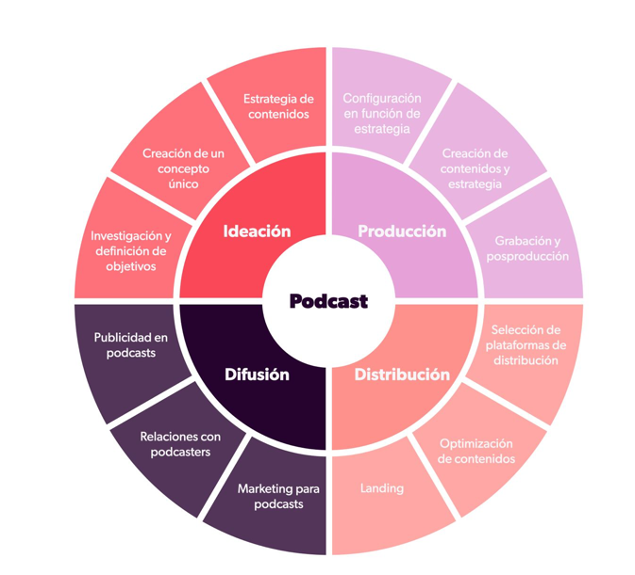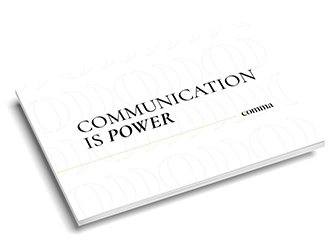In recent years, there has been a growing interest in podcasts and digital audio as an effective communication tool for businesses;
Audiences are increasingly engaged with the format; In recent years, the possibility of creating and distributing audio content has democratised, as has the quality of content production by production companies, brands and platforms;
Alongside the quantity and quality of content on offer, there has been an increase in platforms offering audio content. Today, at last, despite being a historical format on the Internet, audio and podcasts are easily consumable and shareable, and have become a necessary format, channel and platform in any communication strategy due to their high versatility and convenience; It is an intimate, personal, impactful format that audiences consume when, where and from the device they want;
Podcasts have become a popular and affordable channel for consuming content; According to a recent report by Edison Research, 80% of podcast listeners listen to all or most episodes, and 45% listen to all or most branded content.
In addition, the number of podcast listeners worldwide is expected to reach one billion by 2025; Podcast listener profiles range from millennials to baby boomers. The majority of listeners listen to podcasts while doing other activities: at work, on transport or when playing sport; This means that audio content can reach a wide and diverse audience and can be consumed at any time of the day;
Beyond the creation of podcast and audio content as a communication element, the number of brands wanting to ‘advertise’ on the growing number of podcasts is growing. This territory is complicated by the fact that it is highly fragmented and has little aggregated data on topics or audiences; This is where fantastic campaign planning options emerge that go beyond programmatic and bring value to advertisers and podcasters, for example, Korero, a tool that allows advertisers and advertisers to make ‘match’ and monetise podcasts by generating high-value branded content without the need for thousands of listeners.
Korero works with quality branded and podcast content and highly personalised formats; In this way, it avoids a type of advertising that is not very effective in the audio world, such as programmatic advertising, as it often interrupts the rhythm of listening and is out of context, also from the point of view of the editorial line of the podcast;
The effectiveness of podcast advertising has been proven in several studies; Podcast ads have been shown to have higher completion rates and greater audience impact than other forms of advertising.
In addition, the US podcast advertising market is already worth USD 1.8 billion, according to new data from IAB and PwC; Sales last year were up 26 percent, which is double the growth rate of Internet advertising overall, although there was a significant slowdown in the fourth quarter;
Why use audio in communication strategies?
Audio is auseful tool in corporate communication for several reasons:
- It creates a more intimate and personal connection with the audience;
- Podcasts are becoming more accessible and easier to consume for many people; Listeners can listen to your content while doing other activities;
- It is an increasingly versatile format that can be used to tell stories, inform and entertain at the same time; This means that companies can use sound in a variety of ways to connect with their audiences and achieve their communication goals;
Types of podcast content
Working with audio content strategy has already become an essential part of the overall communication strategies of organisations, another element to work with in order to consolidate brand perception; At Voikers, for example, we work on audio content strategy with a proprietary methodology.. Our experience has allowed us to add audio to communication strategies such as:
- Corporate podcasts;
- Corporate fictions;
- Transform blog or web articles into audio;
- Everything that can be seen or read can be heard;
- Transform reports, memos, etc., into audited elements;
- Turn clipping into audible, easily sharable documents;
- Creating Audio’s Digital Identity;
- Create your brand’s Conversational Identity;
- Create your corporate voice;
- Create an audio content hub;
Undoubtedly, audio is a fundamental element in any corporate communication strategy and goes far beyond the podcast; It is essential to work with experts who put their experience at the service of brands and help them plan sound and coherent sound communication strategies; It’s not just about having a podcast; It is about communicating with sound;
How to create a podcast from a strategic point of view
Creating a podcast is a strategic work of impact and, as such, must be approached; For example, Voikers uses a proprietary methodology that strategically phases the creation of podcasts;

Let’s think that when we listen, we give valuable attention and time; That’s why audio becomes a strategic way to sell, to connect, to tell your story…
The four phases are:
- Ideation:the target audience is thoroughly researched, clear objectives are defined and a unique concept is developed that aligns with the brand identity.
- Production: ensures the quality of the episodes through proper equipment and quality audio equipment, as well as careful planning of the content.
- Distribution: on relevant platforms and optimised for SEO, to increase visibility and reach;
- Dissemination: helps promote podcasts through social media, strategic partnerships and a PR strategy, creating greater brand awareness and attracting an engaged audience.






